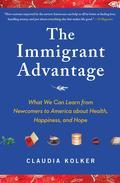Do you have a relative or friend who would gladly wait on you, hand and foot, for a full month after you had a baby? How about someone to deliver a delicious, piping hot home-cooked meal, just like your mother's, right to your front door after work? Do you know people you'd trust enough to give several hundred dollars a month to, with no receipt, on the simple promise that the accumulated wealth will come back to you a year later? Not many of us can answer "yes" to these questions. But as award-winning journalist Claudia Kolker has discovered, each of these is one of a wide variety of cherished customs brought to the United States by immigrant groups, often adapted to American life by the second generation in a distinctive blending of old and new. Taken together, these extraordinary traditions may well contribute to what's known as "the immigrant paradox," the growing evidence that immigrants, even those from poor or violence-wracked countries, tend to be both physically and mentally healthier than most native-born Americans. These customs are unfamiliar to most Americans, but they shouldn't be. Honed over centuries, they provide ingenious solutions to daily challenges most of us face and provide both social support and comfort. They range from Vietnamese money clubs that help people save and Mexican cuarentenas-a forty-day period of rest for new mothers-to Korean afterschools that offer highly effective tutoring at low cost and Jamaican multigenerational households that help younger family members pay for college and, eventually, their own homes. Fascinated by the success of immigrant friends, Claudia Kolker embarked on a journey to uncover how these customs are being carried on and adapted by the second and third generations, and how they can enrich all of our lives. In a beautifully written narrative, she takes readers into the living rooms, kitchens, and restaurants of immigrant families and neighborhoods all across the country, exploring the sociable street lif


